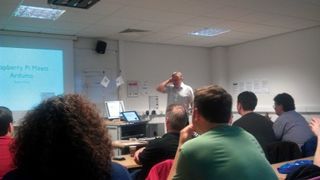Raspberry Jams: why Raspberry Pi is going back to school
A recipe for success
I believed that there would be two sorts of people with Raspberry Pi, those that had created great projects, and those that had tinkered, and then put the Pi in a drawer. My event needed a name, so I asked my wife, and she came up with the name Raspberry Jam, using the word jam in the same way that musicians do, a group playing together.
I hosted the first Raspberry Jam, in a training centre, which is an annex of my school, the room could hold 30 people, and to my surprise, within 30 minutes of posting the event details online, all 30 tickets had been allocated. As this event was building up, I received a message from Australia, asking if they could set up a Raspberry Jam in Melbourne, a few days later Ben Nuttall asked if he could do the same in Manchester, I excitedly said yes to both these requests.

LXF: What support did you need?
AO: Initially, it was help from Martin Bateman, from the University of Central Lancashire (UCLAN) who suggested that they might have a larger room, which I could use to hold the Preston Raspberry Jam. So I took him up on his kind offer, and for the next Jam, I very quickly sold out of all 80 tickets.
I realised that I needed people to bring equipment along to make the Jams happen, so I asked people to bring their projects along, and any spare keyboards/screen etc. It's great to have all of the resources and processes that enable you to produce an event, but what's greater is helping the group to interact with one another, helping their ideas flourish. These one to one interactions make running the Jam well worth it.
LXF: How did you publicise your early Jams?
AO: I used Twitter to spread the news, and to quickly spread the links to the various resources and ticket pages for people to use. For the ticketing I used Eventbrite, as it allowed me greater control over my event.
Get daily insight, inspiration and deals in your inbox
Sign up for breaking news, reviews, opinion, top tech deals, and more.
LXF: What are the Raspberry Pi Foundation's views on the whole Jam phenomenon?
AO: It's been really supportive of what I am trying to achieve, and I see this as a mutually beneficial arrangement, with the Jams supporting its goal of introducing computer science cheaply to children around the world.
LXF: What do you see as the future of the Jams?
AO: I would really love to see more Raspberry Jams taking place during school holidays and weekends. This would really open up the event to more children attending. I want people who wouldn't normally come to events such as this, to come along and try it out. I would love for more Jams to happen around the world, and not just be limited to large towns and cities. So if you haven't got a Jam in your area, start one!
Anyone can start a Jam, all I ask is that if you are child, that you seek help from a parent or teacher, to make sure that everything goes smoothly. The Jams can follow any structure you wish, from an informal hack session, to a conference style event.
At the last Preston Jam, we held a Scratch Dojo, where children and adults learnt to use the language. As long as people discover the potential of the Raspberry Pi, the Jams will continue.
LXF: What would you do differently if you had all of this to do again?
AO: As you may remember, I started the Jams from a possibly selfish point of view, I wanted to know more about the Raspberry Pi. I had no idea that this idea would grow so rapidly, so much, that I was not prepared for the growth - with my life as a teacher and family commitments, I had over committed myself by making myself too available. I wish that I had more experience in these types of events.


















